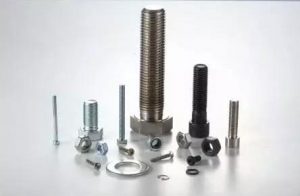Processing Technology of Fastener Products
Fasteners may seem inconspicuous, but they play a crucial role in both industrial production and daily life. So, how are fasteners processed? As a professional fastener manufacturer, XINCHI is happy to share several manufacturing processes for fasteners: cold heading, hot heading, machining, and thread rolling.

Cold Heading: This process utilizes the plasticity of metals, applying pressure or cold drawing to achieve solid-state deformation of the metal. Cold heading is typically performed on specialized cold heading machines, allowing for continuous, multi-station, and automated production.
- Application: Mainly used for bolts, nuts, nails, rivets, and other components.
- Advantages and Disadvantages: The material utilization rate can reach around 80%-90%, and the production efficiency is high, with speeds exceeding 300 pieces per minute. However, surface defects such as scratches, cracks, undercuts, uneven edges, indentation, burrs, and excessive protrusions can easily occur.
Hot Heading: In hot heading, materials are heated and then pressure-formed to achieve the desired shape. The material is placed into a mold and forged after heating.
- Application: Primarily used for large bolts, typically for bolts sized M24 and above.
- Advantages and Disadvantages: The advantage of hot headings is that they are generally used for stronger materials, which may be difficult to form when using cold headings. However, its efficiency is lower than that of cold heading.
Machining: Machining refers to the process of removing material through mechanical means.
- Application: Mainly used for small batch production of specialized or custom hex-head bolts.
- Advantages and Disadvantages: The advantage is high precision and no mold limitations. However, the disadvantage is that production costs are relatively high.
Thread Rolling: Thread rolling involves two rollers moving relative to each other, which shapes the workpiece into a spiral thread groove.
- Application: Primarily used in the production of wood screws.
- Advantages and Disadvantages: The thread rolling process replaces the original turning method, saving materials, reducing production costs, and lowering labor costs. It also makes the threads sharper and significantly improves efficiency. However, defects such as surface cracks or scratches, misthreads, and thread distortion may occur in the threaded parts. These defects are usually detected during the processing stage if they happen in large quantities. If minimal occurrences occur, these defects might go unnoticed during production and be passed on to the users, causing problems.
XINCHI is a trustworthy fastener company, especially in furniture nuts. We have a factory, founded in 2007. And we are the designated fastener supplier to“STAPLE”. As a trusted fastener supplier, XINCHI can offer a wide range of high-quality fasteners, including nuts, screws, bolts, rivets, washers, etc. If you want to know more about fasteners or want to wholesale fasteners, please feel free to contact us. And then our experienced and expert service team will reply to you as soon as possible.

